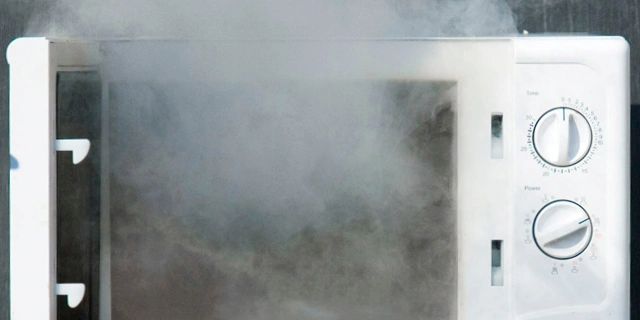In the hottest days of summer, your home appliances work to keep you cool. Your refrigerator supplies a chilled can of soda or an ice-cold water bottle when you need it most, and your washer and dryer gets your kids’ swimsuits ready to go for an afternoon at the pool. Above all, your air conditioner engulfs you in cool air as you step inside your home and escape the heat outdoors.

Your appliances do their best to keep you from overheating, but are you returning the favor? Overheating can damage your appliances, or worse – cause electrical fires. Prevent an electrical fire in your home by identifying the warning signs and learning how to prevent overheated appliances.
Which Appliances Are at Risk of Overheating?
Every appliance in your home could potentially overheat – even your refrigerator! Be sure to keep the following appliances in mind though, as they run a higher risk of overheating:
- Microwave
- Air conditioner
- Dishwasher
- Washing machine/dryer
- Refrigerator
- Vacuum cleaner
- Oven
These appliances tend to overheat from their high power draw. Any item that uses electricity to create or remove heat requires a lot of power. The more power a device uses, the higher the risk of overheating.
The Warning Signs
Because these everyday appliances can easily overheat, it’s important to be aware of the warning signs so you can fix the problem and prevent an electrical fire. Here are a few signs that an electrical device is overheating:
- Frayed cords
- Discolored outlets
- Broken/cracked outlets
- Appliance itself is unusually warm/hot
- Smoke
- Appliance frequently trips the breaker
If you identify any of these warning signs, turn off your appliance and unplug it immediately (if possible). The problem may go deeper than the appliance itself, and an electrician may need to assess the situation. For example, your overheated appliance may have been caused by poor electrical connection, which generates too much wattage for the size of the area.
Prevention Ideas
You may need to enlist a professional if the problem involves heavy-duty electrical work. However, here are some ways to prevent overheating before you have to call an electrician:
- Don’t overload the outlet – One of the biggest mistakes a homeowner can make is overloading an outlet or extension cord. Your largest appliances need an outlet all to themselves. Above all else, don’t try to force three-pronged cords into a two-pronged outlet! Make sure large appliances are grounded and plugged into an appropriate outlet.
- Forget frayed cords – Absolutely do not operate appliances with frayed cords. This is practically asking for an electrical fire. Dispose of frayed cords and invest in some new ones – your appliances and your home will thank you!
- Keep it clean – It is always a good idea to be sure your appliance’s insides, including coils, are clean to prevent overheating. It may be enough to simply wipe down the coils, but in some cases using pressurized air will work better. Remember, when working with coils, check to make sure they are all fully cooled down before touching them. When it comes to your clothes dryer, be sure you remove lint from the catcher after each use to prevent an electrical fire. Also, try to clean out your oven after each use, once it cools down of course. Cleaning your oven regularly will help keep your smoke detectors quiet and reduce the risk of fires. It also keeps grease from baking onto the inside of your oven.
- Consider the condenser– Believe it or not, your cold refrigerator is prone to overheating just like any other home appliance. This summer, pay attention to your refrigerator’s condenser. Condensers can get plugged up with dust and animal hair, so it’s important to have it cleaned regularly.
- Give it a rest – It’s easy to view appliances as tireless machines that never need a break. However, giving your appliance a rest every now and then can improve both its longevity and its performance. For example, if you have been running your A/C during hot days, switch to a fan and open windows for a day.
Overheated Appliances
What happens when an appliance overheats?
When an appliance overheats it can damage the circuits and render the appliance useless. In extreme cases, it can cause a fire or even an explosion, which may lead to personal injury and property damage.
Can overheating appliances cause a fire?
In severe cases, an overheated appliance can catch on fire. The extreme heat inside the appliance ignites flammable components, destroying the appliance. If left unextinguished, the fire can cause severe property damage.
Call Neighborly to Prevent Overheating Appliances Today
Don’t allow your appliances to overheat this summer! Be aware of the warning signs that an electrical device is overheating and refer to this article to prevent it from happening. Ready for more Neighborly tips and tricks? Check out another one of our helpful blog articles!
If your outlets aren’t up to snuff, that can be just as dangerous as overheated appliances. Call (855) 217-8437 to schedule with Mr. Electric, a Neighborly company, to update your outlets.



 Back
Back
 1 (855) 217-8437
1 (855) 217-8437


